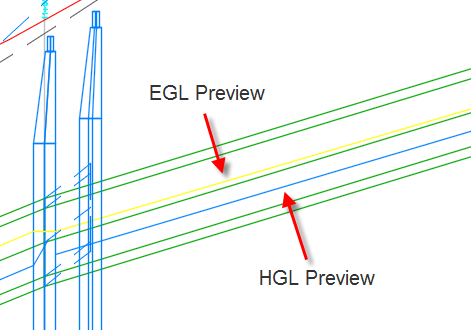Use this dialog box to specify settings to use for analyzing a pipe network. These settings can be applied as default values when you are using the Analyze Gravity Network wizard.
You can access this dialog box from the General page of the Analyze Gravity Network wizard.
Structures
These settings can be used as the default settings on the Structures page of the Analyze Gravity Network wizard, or are used in the analysis calculations.
- Inlet Type
- Specifies the default inlet type: grate inlet, curb inlet, or combination (curb and grate).
- Use Frame Dimensions for Inlet Dimensions
- When set to True, specifies that the values for Frame Length and Frame Width as shown in the structure properties are used to set some values in the Analyze Gravity Network wizard. The structure property value for Frame Length is used for the Grate Length and the Curb Opening Length in the wizard, and the value for Frame Width is used for the Grate Width in the wizard.
- Grate Width
- Specifies the default grate width for grate or combination inlets.
- Grate Length
- Specifies the default grate length for grate or combination inlets.
- Grate Open Area
- Specifies the default grate open area for grate or combination inlets. This is the area between the bars of the grate through which water can flow.
- Local Depression
- Specifies the default value to use for a local depression at the inlet location.
- Curb Throat Height
- Specifies the default throat height for curb or combination inlets.
This is the height of the opening in the curb.
- Curb Opening Length
- Specifies the default curb opening length for curb or combination inlets.
This is the length of the opening in the curb.
Pipes
These settings can be used as the default settings on the Pipes page of the Analyze Gravity Network wizard, or are used in the analysis calculations.
- Minimum Velocity
- Specifies the default minimum velocity of the pipe network.
- Maximum Velocity
- Specifies the default maximum velocity of the pipe network.
- Minimum Cover
- Specifies the default minimum depth of cover to apply. When there is a reference surface, the surface elevation will be used to calculate the cover value. If there is no reference surface, the structure rim (typically 0) will be used to calculate the cover value.
Note: The minimum cover applies to all pipes except the most downstream pipe (connected to the outfall structure). This may result in the outfall structure appearing above ground when the surface is steeper than the entire pipe network.Note: The minimum cover value is measured down to the (inside) crown of the pipe. It does not take into consideration the thickness of the pipe itself. If you need to account for the thickness of the pipe you can adjust the minimum cover value.
- Default N-Value
- Specifies the default roughness coefficient (Manning's n) for pipes.
Note: This default value is always used in the calculations, and is read-only on the Pipes page of the wizard, if Resize Pipes and Reset Inverts is selected on the General page.
- Minimum Crown Drop
- Specifies the elevation drop between two pipes that are connected by a structure, as measured at the pipe crowns. If the crown drop that is calculated is less than the specified minimum value, then the specified minimum value will be used.
Tributary Areas
These settings can be used as the default settings on the Tributary Areas page of the Analyze Pipe Network wizard, or are used in the analysis calculations.
- Minimum Time of Concentration (Tc)
- Specifies a default minimum value to use for the time of concentration (Tc).
Note: When you create a catchment, the time of concentration is calculated for the catchment, and that value is shown on the Tributary Areas page for each catchment. However, if the Tc as calculated for a catchment does not meet the default minimum Tc specified in these settings, an alert icon
 is displayed in the Tc field to inform you that the default value will be used in the calculations. The default minimum value is used regardless of whether you apply the default settings to the Tributary Areas page.
is displayed in the Tc field to inform you that the default value will be used in the calculations. The default minimum value is used regardless of whether you apply the default settings to the Tributary Areas page.
- Known Flow
- Specifies a default known flow (Q) to use for any additional flow not accounted for through the catchments.
- Road Cross Slope (Sx)
- Specifies a default to use for the road lane cross slope.
- Gutter Cross Slope (Sw)
- Specifies a default to use for the gutter cross slope.
- Gutter Width
- Specifies a default to use for the gutter width.
- Gutter N-Value
- Specifies a default roughness coefficient (Manning's n) for the gutter.
- Longitudinal Slope
- Specifies a default to use for the longitudinal slope of the lane.
Graphical View in Profile
Use these settings to control the color of the temporary graphics used in profile view to preview the analysis results.
The following illustration shows a detail of the EGL and HGL lines in the preview.

- Hydraulic Grade Line
- Specifies the color to use in profile view to indicate the HGL.
- Energy Grade Line
- Specifies the color to use in profile view to indicate the EGL.
- New Pipe Size
- Specifies the color to use in profile view to indicate the updated pipe size.